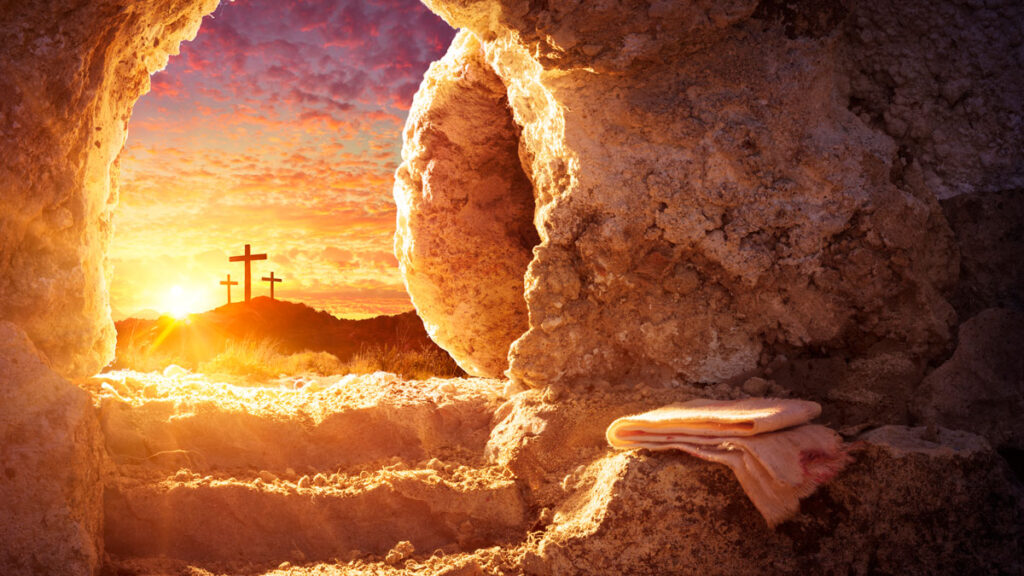Voltaire, the French cynical philosopher, wrote that one should not be concerned about sinning because it is God’s duty to forgive. However, redemption is not so much a matter of divine forgiveness as it is that of divine transformation of human beings by faith in the atonement.
Most Christians have a very limited appreciation of Christ’s death and resurrection. Indeed, most know about the historicity of the two facts but as to their significance, the understanding is at best vague and at worst non-existent. The Christian Church has mostly reduced Christ’s ministry to one of dying to placate an angry God bent on punishing the sinners. According to this limited view, the death of Christ was payment on behalf of sinners; providing God with the legal right to forgive sins, past, present and future. More seriously, it damages the doctrine of grace.
Can one speak of payment and grace in the same breath? This interpretation of the cross ultimately reduces the importance of life transformation to something to be desired and maybe achieved, but not inherently linked to the atonement process.
For the most part, the desire for life transformation (life lived according to God’s law) is seen by many as mere legalism.
The problem starts with our rather vague awareness of what sin did to human nature. When the first human sinned, something occurred that drastically changed his nature, originally identical to God’s own nature. Adam and Eve became keenly aware something had occurred, which caused them to feel guilty, experience fear, cover up, hide and blame. They had allowed the attitude of the Adversary to ensnare them, subverting their nature, which henceforth would be identical to the Adversary’s own. Jesus reproved the religious leaders of His days, saying that they had the devil as their father.
Paul gives the theological interpretation of the consequence of the fall in Romans 5:12. Scripture considers Adam as the federal head of the human race. This means that God created the whole human race in the first human. Even Eve came out of Adam. The choice that he would make when faced with the original temptation would affect all his descendants after him. In simple terms, this means the entire human race became sinful through one man. Sinfulness is about being “egocentric”, which in behavioural attitudes translates into the exclusion of God and everyone else.
God’s Ten Commandments define the nature and practicalities of all human relationships. The first four are about how human beings relate to God and the last six about their relationship with one another. Egocentricity excludes both God and our neighbours from our immediate interests and concerns. Sinful actions, which favour us above them, are the resulting behaviour. Seen in the light of Scripture, sin is primarily a problem of fallen nature (out of sync with God’s nature and purpose), that determines and controls behaviour. The entire human race since Adam’s failure is incurably, morally sick and eternal death is the collective, ultimate fate.
It therefore follows that for a redemptive plan to be effective, it must resolve the sin problem at its source: human nature. An atonement that only provides forgiveness without addressing the core issue is like using a band-aid to cure a fatal disease. What humanity needs is a change of heart; a new heart to replace the old irreparable, sin-polluted heart.
Jesus Christ the Divine Remedy: God’s Son takes Human Flesh (Hebrews 2:14; Romans 8:3)
Genesis 3:15 is God’s promise given to the first humans after they sinned: that sometime in the future, one of their descendants (seed) would take on the serpent and destroy it—at the cost of being bitten. The bite of a serpent brings death which meant the seed would lose His life as well. This verse was, in a nutshell, what the covenant that God made with Abraham was about. When God promised his posterity would be a blessing to all the nations, He meant that out of the nation Abraham fathered would one day come One who would fulfil the divine promise of Genesis 3:15. Israel was most of the time a reluctant and often a rebellious partner. However, in spite of all the delays, God stood by His promise and the Redeemer did come out of the seed of Abraham (see the genealogy of Jesus in Matthew 1:1-17). Luke’s genealogy goes further back and links Jesus with Adam. Jesus, therefore, fulfilled God’s promise given to Adam, to Abraham and to the nations. In Christ, God’s righteousness (faithfulness to His covenant) was fulfilled.
The mystery of the Incarnation is beyond the understanding of Angels (1 Peter 1:12)
Incarnation is a non-human being taking into itself a human nature and body; to be subjected to the same life pressure. In the Bible, a mystery is a truth that the human mind can never imagine or human abilities cause to happen. Mysteries are revealed by God to outline His plans to the human mind.
An example is the Creation narrative. Left on their own, human beings have come up with numerous narratives about creation—the latest being the theory of evolution. That God brought about the heavens and the earth in six days is pure revelation that no human could have come up with.
Sin has marred human nature beyond repair. Even God cannot change human nature from evil and sinful (prone to sin) to sinless and obedient. When Paul wrote that the wages of sin is death, he was not suggesting God would punish the sinners by death. “For when you eat of it you shall surely die” was not prescriptive (what God would do) but descriptive (what would naturally happen; the irremediable consequence).
However, God who is love did not want human beings to die. He put in motion what theology refers to as the divine plan of redemption, designed to do three things:
1. Do away with man’s sinful nature.
2. Provide mankind with a sinless nature and eternal life.
3. Provide mankind with the divine power to obey (live the life of victory over sin).
It is obvious that human nature dies when a human being dies. But the death of one individual does not disarm the sinful nature of every other human being. Even Adam’s own death could not achieve that because by the time he died thousands of sinful men, women and children were alive and did not die with him.
And God stepped into the chaos of humanity and retrieved it from eternal damnation.
Humanity was created in Adam (Acts 17:26) and sinned in Adam (Romans 5:12). But humanity did not die in Adam’s death. Humanity was out of Adam on the path to ultimate death by the time he died. The solution for God was to find a Being who would be willing and able to embody (gather in Himself) the collective human race, and achieve in His own Being the three realities needed to save humanity; while living a perfect and righteous life that would give God the legal right to resurrect Him. Enoch, Moses and Elijah were all taken into heaven but not as representatives of collective humanity. Only Christ was and is the full and complete embodiment of humanity. No created being, angels or anyone else, could ever achieve what was required to save the race. Only the Triune God could. And God stepped into the chaos of humanity and retrieved it from eternal damnation. This was the ultimate re-enactment of the creative act of Genesis 1 when God in the beginning brought out order, beauty and untold benefits from the original chaos.
Jesus, from whom proceeded everything created (Colossians 1:12-17a; John’s prologue), could and did gather back into Himself the fallen race. He did so by taking into Himself their collective fallen nature (Incarnation), which He submitted to the guidance and control of the Holy Spirit, who gave Him victory over the same temptations that assail human beings. Having never given in to temptation in spite of the assumed weakened human nature, He never fell under the control of the evil one. Jesus always determined to do His Father’s will. The Holy Spirit who was in Him from birth, visibly came upon Him after His baptism, giving Him the resolve and power to live a perfect life that never yielded to the pull of the sinful nature assumed.
Hebrews 2:14: “Since human beings have flesh and blood [expression alluding to the sinful nature of mankind], Jesus too shared in their humanity.” He did so in order to destroy the one that has the power of death. Satan has the power of death over mankind because of humanity’s sinful nature and sinful behaviour. The only way to disarm Satan’s power over mankind was to destroy mankind’s sinful nature, thus taking away the hold the devil has on humanity.
The Ultimate Manifestation of Divine Love
Because Jesus never sinned, Satan had no hold on Him and could certainly not cause Him to die. Yet, Jesus had to die to destroy the fallen human nature that He had assumed for that purpose. On the cross Jesus experienced the agony of dying not as the consequence of His sins.
From His birth, Jesus guided by the Holy Spirit, had closely walked with His Father. The tight bond between the two remained unbroken for 33 years. However, Satan who holds the power of death (Hebrews 2:14) could not cause Jesus to die because he had no hold on Jesus. For Jesus to die the Father had to sever the tie between Him and His Son by removing His life-giving presence. The agonising gradual moving away of the Father was the sacrifice that the Father and the Son and the Spirit accepted to go through. Jesus had experienced a foretaste of the agony already in the Garden of Gethsemane when He prayed for the cup to be removed and, fainting, He fell on the hard ground, blood seeping out of His brow.
From the sixth hour to the twelfth, three hours of unnatural darkness enshrouded the land. I believe the darkness symbolised the struggle God underwent to let go of the hand of His beloved Son and the trauma of the Son feeling the slow, lingering, reluctant slipping away of His Father.
With a loud cry that rang across the universe “ALL IS DONE, FATHER INTO YOUR HANDS I COMMIT MY SPIRIT!” Jesus breathed His last. For God so loved the world that he gave (UP) His only begotten Son for you and me.
Unless we appreciate the intense suffering—suffering beyond the physical—that the Godhead experienced, we will never appreciate what the Father, Son and Holy Spirit went through to save you and me. The angels and the rest of the universe experienced deep sorrow as they watched divine agony displayed, first in the garden, then on the cross. Our failure to appreciate what happened ultimately results in failing to love and obey. The cross satisfied the first of the three needs of mankind.

The Resurrection
On Easter Sunday, Jesus walked out of the grave leaving behind forever the fallen human nature that He had assumed. He walked out in the glorious body He had before the Incarnation. His glory dazzled the Roman guards who fell as if dead. The sinless nature that was always Christ’s from eternity, the same nature as that of the first humans created in God’s image, was now available to mankind. Sinless nature cannot experience death. This is why Scripture says that Jesus died only once for the sins of the world. He who believes (adherence by faith) in Christ’s death and resurrection can never die (John 11:25). The second need was fulfilled by Christ’s resurrection.
The power to obey
Sinful human beings are offered the possibility of uniting with Christ so that everything He achieved can also be theirs. This occurs when, by faith, the repentant sinner responds to Christ’s invitation as illustrated in the parable of the true vine. “I am the true vine and you are the branches. If you dwell in me and I in you, you will produce much fruit” and “if you love me you will keep my commandments”. This obedience is not the result of an individual’s self-control over their actions. It is the work of Christ, present through the person of the Holy Spirit, dwelling in that person. “It is God who works in you to will and to act according to his good purpose” (Philippians 2:13). The Holy Spirit fulfils the third need every day in the believer’s life.
Christ’s baptism: the key that unlocks the mystery of Spirit-produced obedience
When Jesus asked to be baptised, John the Baptist initially refused feeling unworthy. Jesus simply said, “Let it be so now, it is proper for us to fulfil all righteousness.” Righteousness when applied to Christ is not about His goodness. It is about fulfilling the covenant (Romans 3:21,22).
The covenant was God’s promise to eradicate sin and redeem the nations. The ministry of Jesus Christ (the Anointed for a particular task) demonstrated God’s faithfulness to His righteousness (the covenant). In and through Jesus, the ancient promise given to Adam and Eve, then to Abraham was fulfilled. Jesus, the Seed of the woman, crushed the head of the serpent on the cross but He Himself was bruised.
Romans 6:1-11 clearly outlines the process by which human beings can unite with Christ: baptism. When they do, His death to sin (sinful nature) becomes theirs; His resurrection in a sinless nature He shares with them; the Holy Spirit is His gift by whom they, like Him, can overcome temptation and live a life of grateful obedience. Ongoing submission to the guidance of the Spirit gradually transforms a human being into the likeness and image of God as was the case for the first humans.
After the resurrection, Christ ascended and sat at his Father’s right hand (position of favour). The believers who by faith are united with Him also sit at the Father’s right hand. (Ephesians 2:4-6).
The multi-hued (original Greek) wisdom of God (1 Corinthians 2:7) as displayed in Christ’s entire ministry from birth to enthronement, is sadly misunderstood when His death is simply interpreted as payment to soothe God’s anger and to purchase His forgiveness. This interpretation says nothing about the death of the sinners’ sinful nature, says nothing about the believer already by faith seated at God’s right hand, and it completely bypasses the concept of the victorious life under the guidance of the Holy Spirit.
The covenant pointed to the Christ-event and Israel was to partner with God in proclaiming it. Sadly they failed and the result was that the first advent was not acknowledged by most. Is it possible that for 2000 years the wrong interpretation of the cross has resulted in the overall unreadiness of the nations for the second advent?
Pastor Eddy Johnson is a retired pastor who writes from Sydney, NSW and has served the Church around the world.






